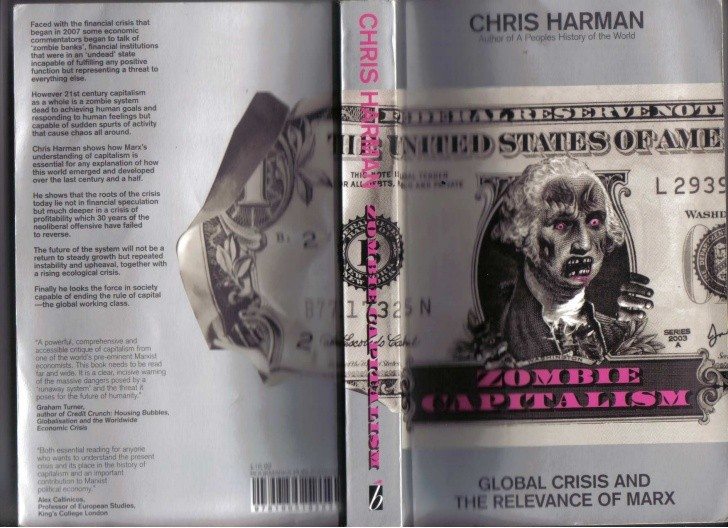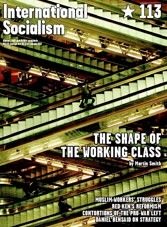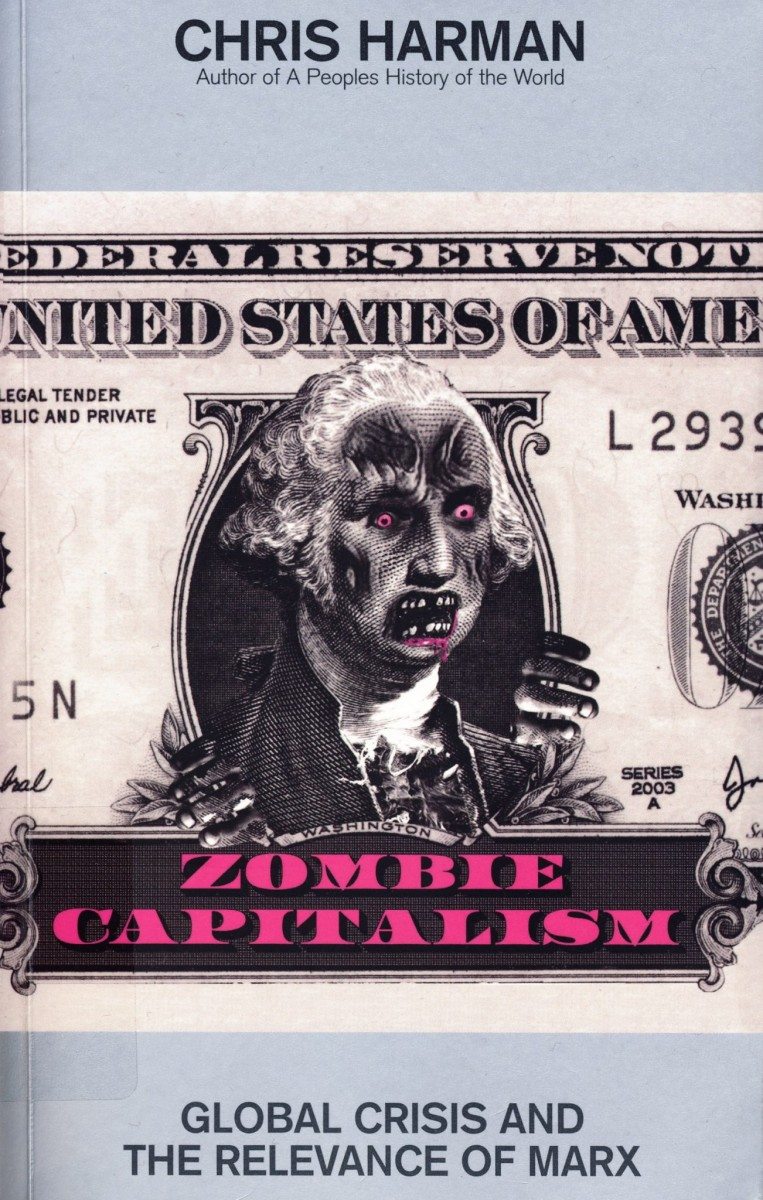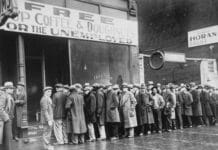Linkbox med anmeldelser og debat + baggrundsartikler til Chris Harmans bog ’Zombie Capitalism’.
December 2009
Se også på Socialistisk Bibliotek:
Personlisten: Chris Harman (1942-2009)
Zombie Capitalism: Global Crisis and the Relevance of Marx
By Chris Harman (Bookmarks, 2009, 424 pages)
“Chris Harman shows how Marx’s understanding of capitalism is essential for any explanation of how this world emerged and developed over the last century and a half. He shows that the roots of the crisis today lie not in financial speculation but much deeper in a crisis of profitability which 30 years of the neoliberal offensive have failed to reverse.”
The book online (Marxists Internet Archive).
Interview with Chris Harman about the book (Socialist Worker, No.2157, 27 June 2009).

Reviews / Debate
Communist Voice
- The Great Recession and the fight against it. By Pete Brown (Issue 47, September 2012)
“[Harman] are right to point to Marxism, but it’s questionable whether [his] particular analysis about the falling rate of profit is the right explanation for today’s ongoing crisis. And [he are] particularly weak on giving advice to the working class about how to fight the effects of today’s recession.”
International Socialism
- Zombie Capitalism and the origin of crises. By Guglielmo Carchedi (No.125, Winter 2010)
“Scholarly books on this subject are not generally known for their readability or their wider appeal. But this book stands out as one of the few fortunate exceptions. It is clearly written in as accessible a style as possible, given the inevitable complexity of much of its subject matter … But aside from these positive features some critical comments are in order.” - Pinning the blame on the system. By Andrew Kliman (No.124, Autumn 2009)
“Because Zombie Capitalism is comprehensive, has a direct style, and constantly brings fact and theory into contact with one another, reading this book is an excellent way for them [younger people] to begin … [but] I do have some differences with the book’s account of recent economic history.”
International Socialist Review
- What are the roots of capitalist crisis? By Lee Sustar (Issue 77, May-June 2011)
“… Harman devotes much of Zombie Capitalism to explaining the long boom as well as the return of crises. This effort takes him on a wide-ranging look at economic history and includes a useful overview of debates in contemporary Marxism on how to apply Marx’s theories to capitalism today. It is here the book is more controversial and, at various points, flawed.”
Marxist-Humanist Initiative
- Reply to Bill Jefferies and the Permanent Revolution organization. By Andrew Kliman (October 23, 2009)
“Bill Jefferies criticizes my recent review of Chris Harman’s new book, Zombie Capitalism. Key points of contention have to do with the current economic crisis and its causes, so my response to Jefferies may be of general interest, and of interest to those who’ve read my new study of movements of profitability in the U.S. corporate sector.”
New Politics
- The unliquidated crisis of capitalism. By Barry Finger (No.49, Summer 2010)
“The merit of Harman’s book, for all its pitfalls and unnecessary dead ends, is that it persuasively locates the current collapse – superficially ascribed in the popular press to lax legislation, financial mismanagement, and greed – on the historical continuum of capitalism.”
Socialist Alternative
- Review: an explanation of capitalism’s limits. By Ben Hillier (No.146, October 2009)
“His latest contribution, Zombie Capitalism, is sweeping in its scope; it is both an outline and defence of Marx’s key insights into capitalism, and a survey of over 100 years of changes in the global economy and economic ideology.”
Socialist Review
- Chris Harman: A masterful book. By Graham Turner (Issue 342, December 2009)
“Zombie Capitalism is a masterful book, a culmination of Chris Harman’s work spanning four decades as one of the world’s leading Marxist economists. The timing of his passing is both tragic and deeply ironic.” - Zombie Capitalism. By Jonny Jones (Issue 338, July 2009)
“Following Harman’s 1984 book, Explaining the Crisis, as well as the numerous articles he has written for the International Socialism journal, it is a book that succeeds in analysing the incredibly dynamic, shifting forms that capitalism and its relationship to the state takes.”
Socialist Worker
- Zombie capitalism (Issue 2157, 27 June 2009)
“Chris Harman, who has just written a new book about why Marxist ideas are key to grasping how the system works, spoke to Socialist Worker.”
Weekly Worker
- Not explaining the crisis. By David Osler (Issue 797, December 10, 2009)
“To some extent Zombie capitalism pulls off what it was designed to do. But that has to be said with a couple of major qualifications. For a start, the work is 100% grounded within the so-called ‘IS tradition’ of the British Socialist Workers Party and its predecessor, the International Socialists.”
International Socialism
From Chris Harman’s preface to the book:
“Anyone interested in greater detail can find some in the articles on economics I have written for the journal International Socialism over the last two decades, while some of the theoretical arguments are articulated more fully in the book Explaining the Crisis (1984).” Explaining the Crisis is online in Danish: Kapitalens krise (Marxisme Online). Originally four articles in International Socialism: Theories of the crisis (No.9, Summer 1980, p.45-80) + Marx’s theory of crisis and its critics (No.11, Winter 1981, p.30-71) + The crisis last time (No.13, Summer 1981, p.1-28) + State capitalism, armaments and the general form of the current crisis (No.16, Spring 1982, p.37-88).
See the articles below:
Not all Marxism is dogmatism: A reply to Michel Husson [on profit rates and crisis] (No.125, Winter 2010, p.95-112)
“This paper was written for a recent conference in Amsterdam organised by the Fourth International.”

The slump of the 1930s and the crisis today (No.121, Winter 2009, p.21-48)
“What is the real character of the present meltdown and what are its implications? Chris Harman compares today’s crisis with the that of the 1929-33 to provide some answers.” See also Harman’s Feedback: Confronting the wolf (No.123, Summer 2009, p.189-194)
From the credit crunch to the spectre of global crisis (No.118, Spring 2008, p.27-42)
“Crunch has become crisis, and many pro-capitalist commentators areb panicking. Chris Harman places their dilemmas in the context of serious underlying difficultie for the globak system.” See also Harman’s Feedback: Misreadings and misconceptions (No.119, Summer 2008, p.159-169)
Theorising neoliberalism (No.117, Winter 2008, p.87-121)
“Neoliberalism is the term used to describe present day economic policies by both their supporters and their opponents. But, argues Chris Harman, many accounts of it are confusing and give the impression that fighting it is an easy alternative to fighting the capitalist system.”
The rate of profit and the world today (No.115, Summer 2007, p.141-161)
“Few of Marx’s idea have produced as much criticism from subsequent Marxists as his theory of the falling rate of profit. Chris Harman explains the theory and looks at its relevance to capitalism today.”

Snapshots of capitalism today and tomorrow (No.113, Winter 2007, p.119-137)
“Neoliberalism and the drive to war are not accidental features of the world today, insists Chris Harman. Using a series of of graphs and tables he shows how they are linked to the present trajectory of capitalism.”
China’s economy and Europe’s crisis (No.109, Winter 2006, p.69-90)
“Growth in China and India is the excuse mainstream politicians use for neo-liberal attacks. Chris Harman looks at the reality of Asian growth, and its connection to global instability and the attacks on workers in the West.”
Analysing imperialism (No.99, Summer 2003, p.3-81)
“Chris Harman takes us through the bloody 20th century. He shows how a clear understanding of the relationship between military and economic competition is crucial for building an effective anti-imperialist movement today.”
The workers of the world (No.96, Autumn 2002, p.3-45)
“Chris Harman examines the relationship between the working class and other classes, the urban poor and the peasantry. He concludes with an assessment of the kind of socialist strategy that flows from the current make-up of the class strcture.”
The new world recession (No.93, December 2001, p.99-112)
“Chris Harman examines the new world recession, arguing that the contradictions which lead the economy from boom to bust were already well in place.”
Beyond the boom (No.90, Spring 2001, p.41-69)
“Chris Harman looks at the causes of the boom, and at the reasons for the slowdown which is now encompassing the world’s largest economy. He examines the inability of establishment economists to explain the return of the boom-slump cycle, the relationship between finance capital and the real economy …”
Globalisation: a critique of a new orthodoxy (No.73, Winter 1996, p.3-33)
“Chris Harman examines the claim that the world market is now such a powerful force that neither states nor organised labour can withstand its pressures. He debunks the assertations of globalisation theorists and gives a careful account of the inter-relationship between multinational capital, the state and the modern working class.”
The crisis of bourgeois economics (No.71, Summer 1996, p.3-56)
“Chris Harman examines the failure of establisment economic thought and charts the dilemma with which it faces both Labour and Tories politicans.”
Where is capitalism going? Part 2 (No.60, Autumn 1993, p.77-136)
“Here Chris Harman looks at some key economics in the ‘third world’ – India, China, and the Newly Industrialising Countries of the south and east Asia. He traces the links between the economic changes of the last 20 years, the fall of both state capitalist and the neo-liberal economic orthodoxies, and the growth of instability in the world imperialist system.”
Where is capitalism going? (No.58, Spring 1993, p.3-57)
“Chris Harman looks at the weaknesses of the 1980s boom, the seriousness of the new slump and at the relevance of Marxist theory in providing an explantion of how the one turned into the other. This first part looks at the core of the system, the advanced capitalist states.”
The state and capitalism today (No.51, Summer 1991, p.3-54)
“Chris Harman examines the relationship between capital and the state, from its early days through to the globalisation of capital and the spread of multinational corporations. He shows how these trends are underpinned by political structures and supported by military might.”
The myth of market socialism (No.42, Spring 1989, p.3-57)
“The tide of free market ideas is running as strongly as ever among socialists, both in the West and in Eastern Europe. Chris Harman confronts the work of Alex Nove, one of the foremost theorists of market socialism.”
Se også på Socialistisk Bibliotek:
- Emneoversigt Marxisme / Økonomi
- Emneoversigt Økonomi / Economy
- Personlisten: Chris Harman (1942-2009)
- Linkboxen: A People’s History of the World



































